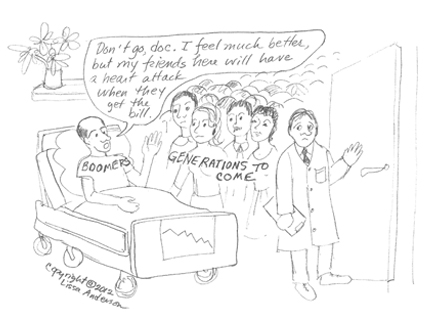In general, each generation of Americans has expected to do better economically than the one before, and those expectations have, by and large, been met. Today’s young people face a less hopeful future, however. Who is to blame? Many economists point to the baby boomer generation.
After World War II, between 1946 and 1964, some 76 million children were born in the United States. This so-called “baby boom” affected the country’s economy in several ways. As the boomer generation reached adulthood, the labor supply expanded and included more women. Households had fewer children and more wage earners. The boomers became much more financially successful than earlier generations. Through sheer numbers, the boomers also became politically powerful. They influenced the government to lower their taxes and expand their benefits. This imbalance of income and spending has helped cause a huge deficit. That is, the government spends more money than it takes in. A large deficit is a drag on the economy and threatens the financial success of later generations. Medicare and Social Security payments are major components of government expenditures. As the baby boomers age, they will require more and more support from those programs, while paying less and less into the system. Analysts argue about if and when these programs will go broke, but most agree that solutions must be found for the programs to remain solvent.
One proposal for fixing Social Security is called “means testing”—paying less to retirees who have substantial nongovernment income. Means testing has been criticized for its potential to erode support for Social Security, because if the program is seen as welfare, it will be less popular. Other critics say that means testing constitutes a tax increase or that everyone who pays into these funds should benefit equally in the pay-out.
An option for shoring up Medicare is to limit expensive treatments for patients whose chances of survival are very slim. This option is extremely controversial, however, and subject to misrepresentation. Few politicians dare to support it.
How will your generation solve the economic woes that you have inherited?
Image credit: © Lissa B. Anderson
Related Links
- The Next Crisis: Sponging Boomers
Read statistics about the baby boomers and what they are leaving behind.
(Source: The Economist, September 29, 2012) - Fixing the Social Safety Net: Easy Solutions That Might Offend Everybody
Daniel S. Hamermesh, an economics professor at the University of Texas and the University of London, proposes what could/should be done to repair the social safety net.
(Source: Austin American-Statesman, October 14, 2012) - Option: Begin Means-Testing Social Security
Read arguments for and against means-testing for Social Security.
(Source: AARP Public Policy Institute, June 22, 2012) - North America > United States > Age Distribution
View population pyramids for the Unites States for representative years from 1950 to 2050.
(Source: U.S. Census Bureau; accessed October 31, 2012) - Social Security
Everything you ever wanted to know about Social Security, from the official website.
(Source: U.S. Social Security Administration; accessed October 31, 2012) - Social Security Debate in the United States
This site lists several other related links where you can find various arguments regarding Social Security.
(Source: Wikipedia; accessed October 31, 2012)





Hello Social studies Website